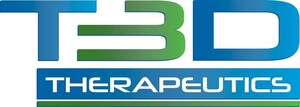RESEARCH TRIANGLE PARK, N.C., Nov. 3, 2023 /PRNewswire/ -- T3D Therapeutics presented top-line results from its Phase 2 PIONEER study at the 16th international conference on Clinical Trials in Alzheimer's Disease (CTAD). The double-blind study compared 3 doses of T3D-959 versus placebo administered orally once a day for 24 weeks in 250 patients with mild to moderate Alzheimer's Disease (AD). Results suggest the potential of T3D-959 to be disease modifying in mild-to-moderate severity Alzheimer's patients. Biomarker data showed modification of multiple disease pathologies inherent in AD. Clinical evidence of improvement in cognition was shown in a sub-group of patients identified with a new blood biomarker of Alzheimer's disease (AD) pathology, pTau-217/Non-pTau-217 ratio. A high pTau-217 ratio in the blood defined an Alzheimer's disease population responsive to T3D-959 therapy. An excellent safety profile was demonstrated after 24-weeks of once daily oral dosing. Analyses showed:
- The ITT population (all randomized patients) had significant improvement with T3D-959 treatment vs. placebo:
- In a biomarker of amyloid plaque burden, plasma Ab42/40 ratio (PrecivityAD™), with 30mg of T3D-959 vs. placebo (p=0.021).
- In fasting plasma glucose, insulin, HDL and other lipids, indicators of an improved metabolic profile.
- In a plasma biomarker of neurodegeneration, neurogranin (p=0.013).
- In multiple plasma metabolomic biomarkers of AD neurodegeneration, inflammation, insulin resistance, mitochondrial dysfunction and oxidative stress.
- In multiple plasma proteomic biomarkers of AD, amyloid plaque formation, neurodegeneration, inflammation, mitochondrial dysfunction and oxidative stress as measured by LC-MS,
- The ITT population had an excellent safety profile with no drug -related adverse events related to stroke and no clinical signs of ARIA.
- 55% of subjects had a pTau-217/Non-pTau-217 ratio ≥0.015 indicating they had AD pathology (high pTau-217 ratio group) and exhibited cognitive decline in the placebo group consistent with AD.
- The high pTau-217 ratio group dosed with 30mg of T3D-959 (N=30) exhibited:
- An improvement of 2 points vs. placebo in ADAS-cog11 with an effect size at 24 weeks equivalent to or better than that observed for anti-amyloid plaque antibodies at 76-78 weeks.
- Stronger improvement in the plasma Ab42/40 ratio than the ITT population.
- A 30mg q.d. dose was identified as providing optimal safety and efficacy for further investigation in a Phase 2b/3 clinical trial in mild-to-moderate AD patients.
John Didsbury, Ph.D., Chief Executive Officer of T3D said "PIONEER positive outcomes achieved the goal to inform the design of a larger and longer Phase 2b/3 trial, with dose selection, a 'responder' population of AD patients and biomarkers to assess. "
"The exciting results of this study show potential to modify the course of Alzheimer's disease in a unique way. I look forward to seeing these results confirmed and expanded in a larger and longer Phase 2b/3 clinical trial" said Michael Weiner MD, Professor Emeritus at the University of California, San Francisco, and principal investigator of the Alzheimer's Disease Neuroimaging Initiative (ADNI).
"The outcomes of this trial are encouraging and lay a foundation for advancing the further development of this new molecule to treat Alzheimer's disease" said Pierre N. Tariot MD, Director of Banner Alzheimer's Institute.
About T3D-959: T3D-959, a small molecule, delivered orally once daily, is a brain-penetrating PPAR delta/gamma dual nuclear receptor agonist designed to improve both glucose and lipid metabolism dysfunctions present in AD and other neurodegenerative disorders.
About the Study: The Phase 2 PIONEER study (Prospective therapy to Inhibit and Overcome Alzheimer's Disease Neurodegeneration via Brain EnErgetics and Metabolism Restoration) was a double-blind, placebo-controlled, parallel-group Phase 2 safety and efficacy study that enrolled 250 adults with mild-to-moderate Alzheimer's disease (MMSE 14-26). PIONEER was designed to assess the safety, tolerability, and effectiveness of T3D-959 in the treatment of Alzheimer's disease. T3D-959 was administered orally once daily over a 24-week dosing period. Subjects received one of three different doses of T3D-959 (15mg, 30mg, or 45mg) or a placebo. To learn more about this study please visit www.clinicaltrials.gov and reference study number NCT04251182.
PIONEER is supported by the National Institute on Aging, part of the National Institutes of Health, under award number R01AG061122 and by the Alzheimer's Association's Part the Cloud Gates Partnership Grant Program.
About T3D Therapeutics, Inc.: T3D Therapeutics, Inc. is a privately held, Research Triangle Park, NC-based company. The Company has an exclusive license to T3D-959, its lead product candidate, and a platform of structurally related molecules. T3D Therapeutics' mission is to develop and commercialize T3D-959 for the treatment of Alzheimer's disease. Additionally, T3D Therapeutics is targeting treatments for other neurodegenerative diseases with an emphasis on Huntington's Disease (HD).
For more information visit http://www.t3dtherapeutics.com/.
CONTACT:
John Didsbury, Ph.D., CEO
T3D Therapeutics, Inc.
1-919-237-4897
Email: [email protected]
Related Links http://www.t3dtherapeutics.com for content
SOURCE T3D Therapeutics, Inc.

WANT YOUR COMPANY'S NEWS FEATURED ON PRNEWSWIRE.COM?
Newsrooms &
Influencers
Digital Media
Outlets
Journalists
Opted In





Share this article